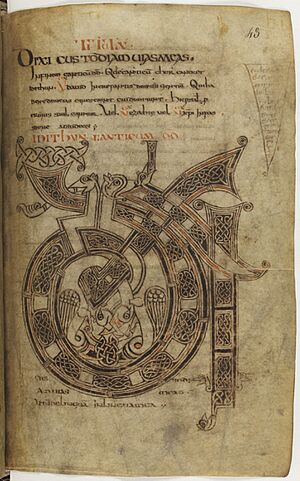Angilbert facts for kids
Quick facts for kids SaintAngilbert |
|
|---|---|
| Abbot of the Monastery of St Richarius Count of Ponthieu |
|
| Born | c. 760 |
| Died | 18 February 814 Centule, Austrasia, Francia |
| Venerated in | Catholic Church |
| Beatified | Pre-Congregation |
| Canonized | 1100 by Pope Urban II |
| Feast | 18 February |
Angilbert (born around 760 – died February 18, 814) was a noble Frankish poet. He was a smart and talented person who worked closely with the famous emperor Charlemagne. Angilbert was a secretary, a diplomat (someone who represents their country), and even became Charlemagne's son-in-law. He is remembered as a saint in the Catholic Church and is honored on February 18 each year. He was also known as the Count of Ponthieu.
Contents
Life of Angilbert
Angilbert grew up at Charlemagne's royal court. He attended the palace school in Aachen, which is now in Germany. There, he was a student and later a friend of the famous English scholar Alcuin.
When Charlemagne sent his young son Pepin to rule Italy as King of the Lombards, Angilbert went with him. Angilbert held an important job called primicerius palatii, which meant he was a top administrator in Pepin's court. He helped Pepin govern Italy for a while.
Angilbert also worked as a diplomat for Charlemagne. He delivered important documents to Pope Adrian I. These documents were about a religious debate called Iconoclasm, which was about whether religious images should be used. Angilbert was sent on three important trips to the Pope in 792, 794, and 796. He also worked as an officer in areas near the sea.
In the year 800, Angilbert traveled with Charlemagne to Rome. He was also one of the people who witnessed Charlemagne's will in 811.
Angilbert's Family Life
Angilbert had a relationship with Bertha, daughter of Charlemagne, who was Charlemagne's daughter. Some stories say they were married, while others say they were not. However, they did have at least one daughter and two sons together.
One of their sons, Nithard, became a well-known person in the mid-800s. Their daughter, Bertha, later married Helgaud II, who was also a Count of Ponthieu. Historians believe that Charlemagne might have preferred his daughters not to marry formally. This was because he worried that their husbands could become political rivals. None of Charlemagne's daughters had formal marriages, even though there were offers for arranged marriages.
Angilbert as an Abbot
In 790, Angilbert decided to live at the abbey of Centulum. This was also known as the "Monastery of St Richarius" in what is now Saint-Riquier, France. In 794, he was chosen to be the abbot, which is the head of a monastery.
It was common for kings in those times to make important laymen (people who were not priests) abbots of monasteries. Sometimes, these laymen would use the monastery's money for themselves. But Angilbert was different. He spent a lot of money rebuilding the Saint-Riquier monastery. When he finished, Charlemagne himself visited the monastery for Easter in the year 800. Angilbert also started a school at Saint-Riquier to educate local boys. This was in line with Charlemagne's goals for education.
Angilbert's Poetry
Angilbert was a talented poet who wrote in Latin. His poems show that he was a cultured person who was very close to the royal family. Charlemagne and the other men at court often used playful nicknames for each other. Charlemagne was called "David," like the Biblical king. Angilbert was nicknamed "Homer" because he wrote poetry, just like the famous ancient Greek poet.
Angilbert probably wrote a long poem, called an epic. A part of this poem still exists today. It describes life at the palace and a meeting between Charlemagne and Pope Leo III. This poem was created by taking ideas from famous Roman poets like Virgil and Ovid.
Angilbert also wrote shorter poems. One poem was a greeting to Pepin after he returned from a battle. Another poem, an important letter to Charlemagne (called David), gives us a lovely picture of Angilbert's life. It shows him living with his children in a house with beautiful gardens near the emperor's palace. In this poem, he mentions Bertha with respect, simply including her name in a list of princesses he greets.
Another poem, De conversione Saxonum, which is about the conversion of the Saxons, is also thought to have been written by Angilbert.
See also
 In Spanish: Angilberto de Centula para niños
In Spanish: Angilberto de Centula para niños
 | Isaac Myers |
 | D. Hamilton Jackson |
 | A. Philip Randolph |


